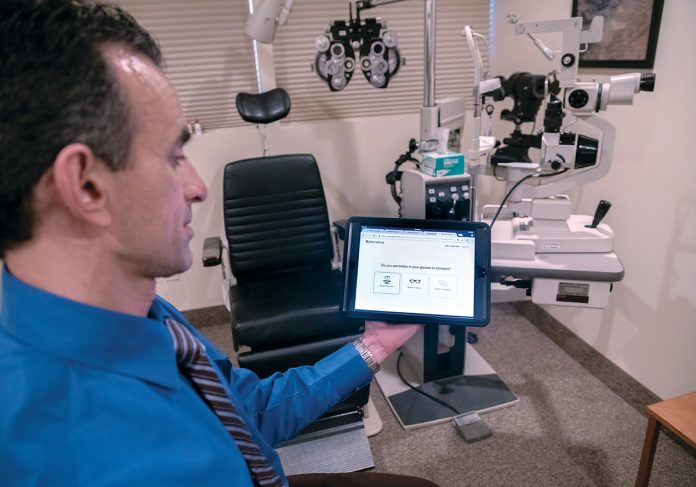Local optometrists are arguing for “standard of care” regulation of online vision tests for corrective lens prescription renewals, rules branded protectionist by manufacturers, pitting eye doctors’ efforts to preserve patient interaction against software services providing convenient, remote eye care.
Corrective lens manufacturers, including 1-800 Contacts, Opternative and Warby Parker, offer software allowing customers who have received a prescription from their optometrist to renew it with a test of their vision after a brief quiz to assess their health, said Michael Mandel, chief economic strategist at the Progressive Policy Institute, a Democratic-aligned public policy think tank in Washington, D.C. Results from the vision test are sent to a licensed optometrist for review before new contact lenses or eyeglasses are delivered to the customer.
The problem with that, said Dr. Stephen M. Montaquila, an optometrist with West Bay Eye Associates in Warwick, is an in-person visit with an eye doctor involves an exam of a person’s ocular health, addressing more than vision. During an in-person eye exam, he said, an optometrist screens for problems. One of his patients lost an eye from an infection from a contact lens that hadn’t been caught soon enough, he said.
Montaquila, a member of the Rhode Island Optometric Association and chair of the organization’s legislative committee, helped draft the Consumer Protection in Eye Care Act regulating vision-test software.
The act was introduced in House and Senate companion bills, H5674 and S2402, respectively, for the 2018 General Assembly legislative session. The legislation would:
• Ensure contact lenses and eyeglasses prescriptions last at least one year.
• Require a prerequisite in-person exam before being able to use an app for an exam.
• Require online exams use simultaneous two-way communication and verify the patient’s identity.
• Mandate that the equipment be Food and Drug Administration-approved and providers have liability insurance.
The bill would also impose a $10,000 penalty for violations of the proposed law, and award individuals filing successful complaints against violators $1,000 per each day the violation was in effect.
The bill stalled March 22 in the Senate Committee on Health and Human Services when medical professionals criticized it as too broad, outlawing telemedicine altogether.
“There are aspects of the bill we can support, but the bill as written is a little too broad because it does, as written, prohibit telemedicine,” said Dr. Richard Bryan, retinal specialist and president of the Rhode Island Society of Eye Physicians and Surgeons, during testimony before the committee.
For instance, Bryan said, vision-test and eye-exam software has been recently used to examine infant eye health among families living in remote areas, using photos that are sent to optometrists who screen for visual signs of common eye problems. The bill would require such families establish a relationship with such doctors before using such software.
“[The requirement], of course, is impossible,” Bryan said.
The Federal Trade Commission, in a letter to Washington state Rep. Paul Graves, a Republican who submitted a bill with similar language under consideration by the Washington legislature, noted such restrictions are anti-competitive and mandate decisions best left to licensed optometrists.
In fact, the American Academy of Ophthalmology recommends healthy adults under 40 receive an in-person eye exam every five to 10 years; two to four years for patients age 40-54; one to three years for patients age 55-64; and one to two years for patients age 65 and older.
“By requiring an in-person, comprehensive eye examination for all corrective lens prescriptions, the bill would restrict the use of innovative telehealth eye care technologies, and also could require examinations that are more extensive and costly than necessary,” the FTC wrote in its Feb. 9 letter to Graves.
Sen. Joshua Miller, D-Cranston, encouraged Bryan to work to that end with the Rhode Island Optometric Association and other sponsors of the bill.
“We have been in constant communication with Dr. Bryan and his team and expect to have a final product of our collaboration in the coming weeks. We do agree on the most important points but want to be sure that we also address their concerns,” Montaquila said.
Mandel said the bill, as it stands, threatens to cast Rhode Island as anti-innovation.
“One of Rhode Island’s biggest issues these days is how to attract jobs and project an image of being innovation-minded,” Mandel said. The bill undercuts that strategy, he added.
Montaquila said he is comfortable advising some of his younger, healthier patients to use vision-test apps to verify their prescription hasn’t changed substantially. Those patients wouldn’t necessarily need a full exam every year. Ideally, he said, a doctor would suggest a vision app to patients as a convenient check-up in between exams every two or three years.
“Based on the technology as it exists today, I think that’s a safe way for the patient to use it,” Montaquila said.













